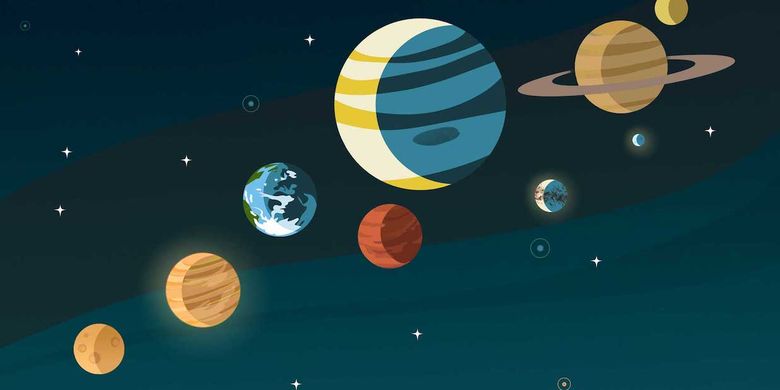KOMPAS.com – Solar system consists of the Sun, eight planet, asteroid fibers, and oort clouds. But only on Earth is there life.
Have you ever wondered why not all planets are on solar system livable for Humans?
To be able to support human life, a planet must be included in the habitable zone (living area).
Reporting from Exoplanet Exploration NASA, the habitable zone is a planet that is not too hot, not too cold, has oxygen, dense soil, radioactive exposure is not too large, and also has a distance from the star that allows water to be liquid.
Water in liquid form is needed as a universal solvent in the process of removing sewage, sweat, toxins, replenishing body cells, dissolving vitamins, minerals, as well as medicines in the human body and other living things.
The essential function of water is what makes a planet unable to support human life without water in liquid form. In our solar system, only Earth has liquid water on its surface.
Also read: The Function of Water for Life
Other planet conditions
Mercury is too close to the Sun to have a very thin atmosphere, with very little oxygen. Mercury does not support life because it is too hot, has no liquid water (only ice and vapor), and is exposed to powerful solar winds all the time.
Venus has a very high atmospheric pressure, about 89 times greater than the atmospheric pressure of Earth. This enormous pressure can destroy the human body so that Venus is not habitable. Venus is too hot for any living thing nor is it completely waterless.
Mars has an atmosphere that is thinner than Earth, so it is very vulnerable to asteroid impact. Mars is also uninhabitable due to low oxygen levels and the absence of water on its surface.
However, it was recently discovered that Mars has traces of water and is predicted to have liquid water beneath its surface.
Jupiter cannot be inhabited by humans or other living things because Jupiter is a giant gas ball. Jupiter does not have a solid surface like the earth.
Not to mention the storms that rage all the time, and also the strong gravitational and magnetic fields that can destroy the bodies of living things.
Saturn has an atmosphere that resembles the Sun because it consists of hydrogen and helium which makes it very hot. The oxygen content is low, and there is no solid ground because it is only a gas.
Continuous strong hurricanes, as well as strong gravitational and magnetic fields prevent humans from living on Saturn.
Uranus has water but only in the form of ice. Apart from the absence of liquid water, Uranus also has very extreme weather where winter lasts in 21 years without the sun.
As for summer, it lasts 21 years without night. Uranus is also too far from the Sun, which causes the planet to be too cold for humans to live in.
Neptune has a surface that is formed from water and ice, but that surface will continue to move so that there is no fixed foothold for humans to live. Neptune is also too far from the sun.
Coupled with a very thick atmosphere, this makes it difficult for sunlight to enter Neptune. As a result, Neptune is too dark and cold for humans to live in.
Not to mention the wind supersonic the high-speed speeds that sweep Neptune over with clouds of frozen methane every time, rendering living things unsustainable.
 –– .
–– .

